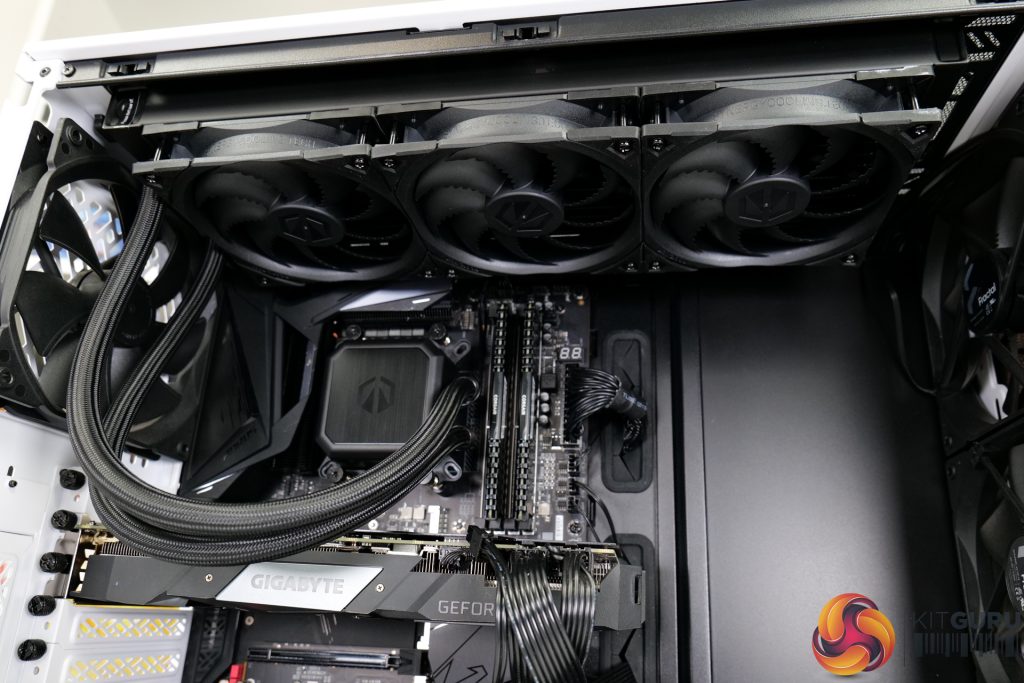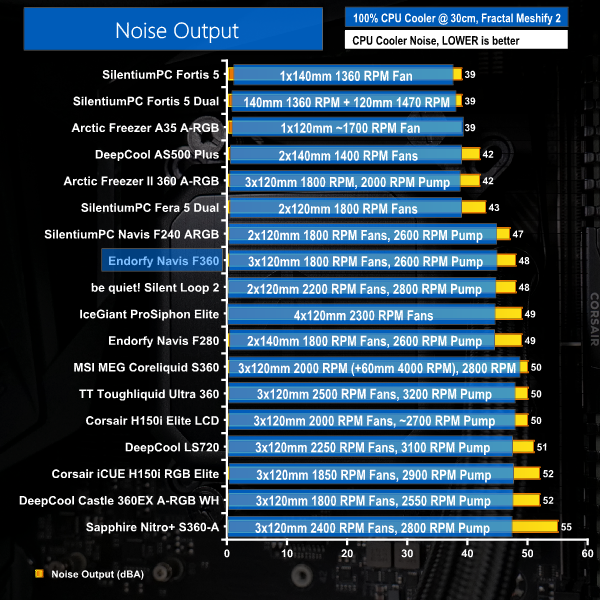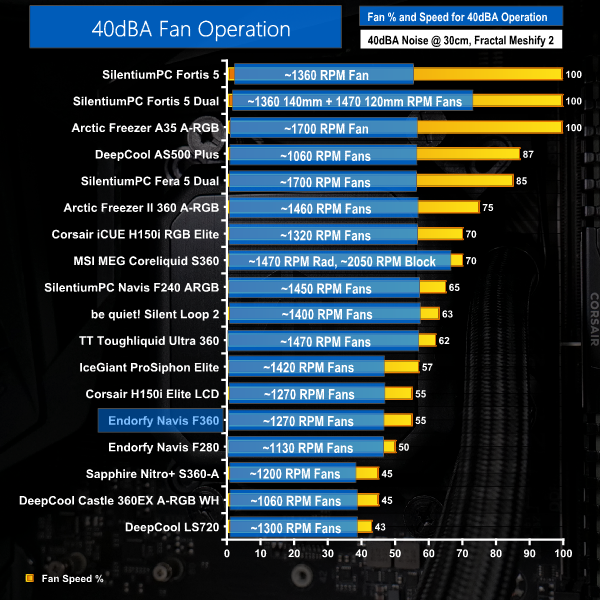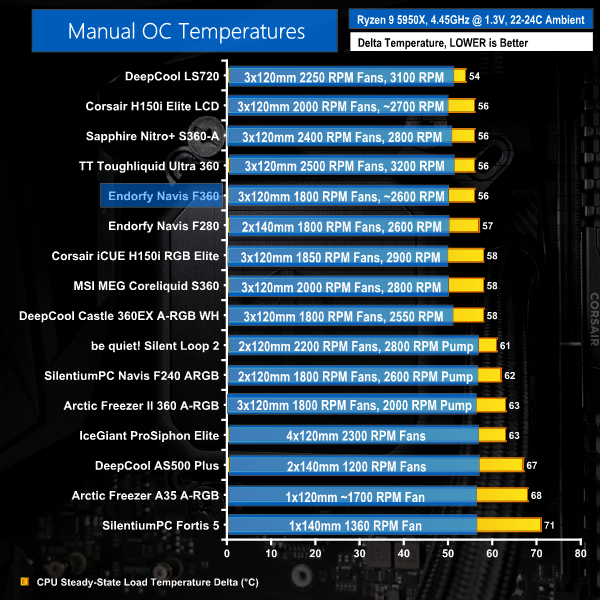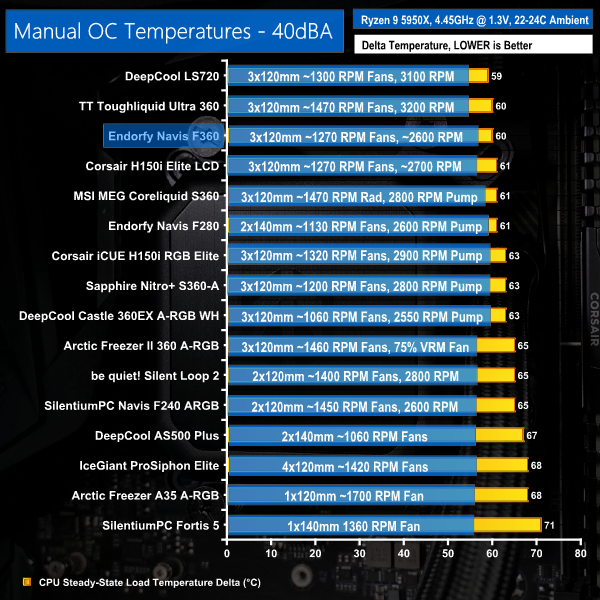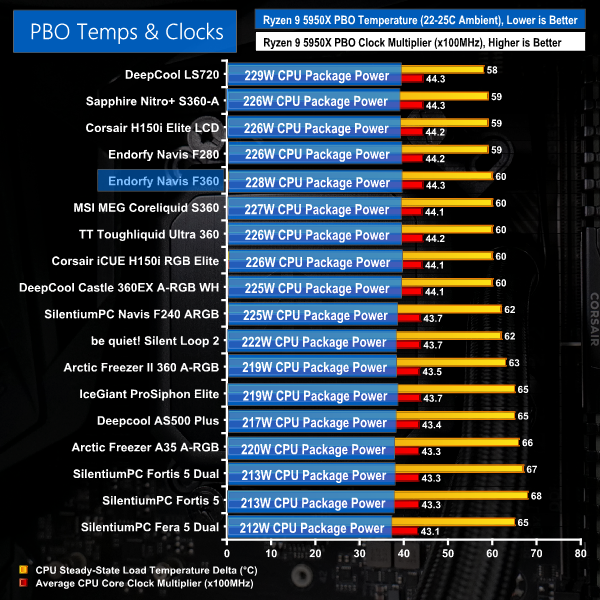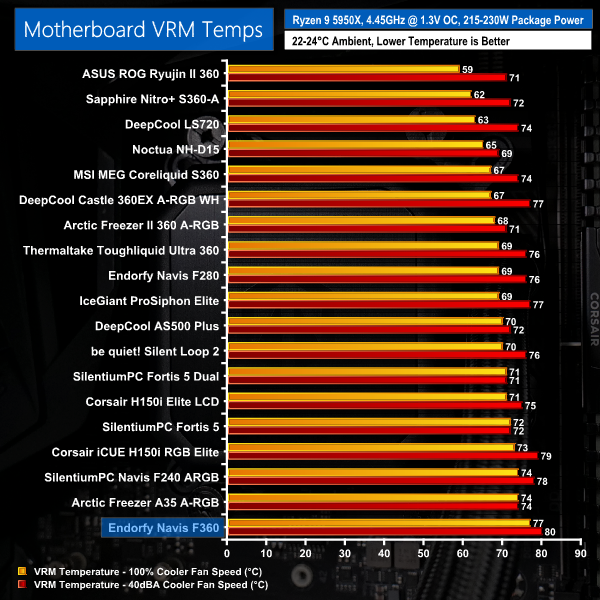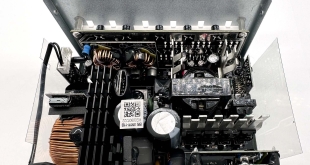Test System:
- Processor: AMD Ryzen 9 5950X
- Overclocked Settings: 4.45GHz all-core @ 1.312V (UEFI), Medium LLC – around 1.3V delivered
- Motherboard: Gigabyte B550 Aorus Master
- Memory: 32GB (2x16GB) Corsair Vengeance LPX 3600MHz 16-18-18-36 DDR4 @ 1.35V
- Graphics Card: Gigabyte RTX 2060 Super 0dB Mode
- Chassis: Fractal Design Meshify 2
- Chassis Fans: 2x140mm 1000 RPM Fractal Front Intake, 1x140mm 1000 RPM Fractal Rear Exhaust, 1x140mm 1000 RPM be quiet! Pure Wings 2 Roof Exhaust (for air cooler testing)
- Power Supply: Seasonic Prime TX-1000
- Operating System: Windows 10 Pro 64-bit
Testing Methodology:
- For testing, we use a 30-minute looped run of Cinebench R23 and record the steady-state CPU temperature at the end of the test. This ensures that the CPU has had ample time to warm up and reach steady state under all of the coolers.
- Ambient is maintained around 22-24 degrees Celsius. Where there is variation beyond this temperature range, we add in extra repeated tests to ensure consistency.
- We also test each cooler with at least two fresh installs (typically three) to mitigate the likelihood of a dodgy mount spoiling results.
Test Results:
Acoustics
Let’s start off with noise performance at 100% fan speed. This is important for getting an indication of where our performance expectations should lie based on noise output.
Triple 1800 RPM Fluid Dynamic Bearing fans on the Endorfy Navis 360 aren’t exactly quiet at full speed, but they aren’t too bad either. With a noise output rating of 48 dBA for our test scenario, this is actually one of the quieter 360mm AIOs that we have tested. The speed control range is pretty good, too.
In order to get the cooler running at 40 dBA, we had to drop the trio of fans to 55% of their maximum PWM duty cycle. This translated into around 1270 RPM operating speed according to the UEFI readings.
That’s a large drop in fan speed, even versus some of the other 360mm AIOs. It highlights that the chosen Endorfy fans are perhaps not the most noise efficient, even though they do well at full speed.
So, that final point, highlights that there is clearly headroom to ramp up the fans without adding too much more noise stress compared to some other 360mm AIOs.
Thermal Performance
Full-speed performance from the Endorfy Navis F360 is very good on our overclocked Ryzen 9 5950X test CPU. The performance result from this budget option is right up there with some of the best 360mm AIOs on the market. And it’s a smidgen better than the 280mm Navis F280 from Endorfy, too.
When locked at 40 dBA noise output, the Endorfy Navis F360 does very well in our test hierarchy. Here, it maintains its position as one of the best performing 360mm AIOs that we have tested. And it continues to outdo Endorfy’s own 280mm cooler by a very slim margin.
This is a very positive result!
Next up is the Precision Boost Overdrive set of results. Firstly, it is critical to note that small difference in the displayed delta temperatures are not as important for our PBO testing because the clock speed and cooling power achieved are more important metrics.
Switching back to full fans speeds and with the processor running in Precision Boost Overdrive mode, we continue to see strong performance from the Endorfy Navis F360. While the recorded temperature is slightly higher than some of the AIO comparisons, this is not really a clear indication of PBO performance. And that is because the 360mm AIO does very well in terms of recorded CPU frequency and the package power handled.
Once again, we see very strong performance from the Navis F360 that indicates its ability to compete with some of the market’s premium 360mm AIO offerings.
VRM cooling performance is poor, though. This may be due to the mounting location with respect to concentration of the fans’ airflow. Whatever the reason, our test system did not fair well for VRM thermals when used with the Navis F360.
 KitGuru KitGuru.net – Tech News | Hardware News | Hardware Reviews | IOS | Mobile | Gaming | Graphics Cards
KitGuru KitGuru.net – Tech News | Hardware News | Hardware Reviews | IOS | Mobile | Gaming | Graphics Cards


